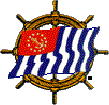 |
|
|
|---|---|---|
National Law
|
|
|
| |
||
Copyright Issues
This article first appeared in the September 1997 "USPS Editor's Newsletter." Since that time, USPS has expanded its Marketing efforts at all levels of the organization. To assist squadron members with these activities, this page has been expended to address both newsletters and squadron web pages.
This article is general in nature. Specific questions about your publication should be directed to your Squadron or District Law Officer.
Why is copyright important?
Copyright is a form of property created by Federal law. It has all the characteristics of property: it can be bought, sold or given away, and includes the right to prevent "trespass" (infringement) by an unauthorized user. Copyright protects a creative expression, not an idea. Quality isn't important. The simplest "Roses are red, Violets are blue" poem can contain an original creative expression which the law will protect.
The owner's rights under Federal law start from the instant of creation as a work that can be read by the author or anyone else. The physical form doesn't matter. The creator could be working with pen and paper, charcoal and a sketchpad, a typewriter, or a computer. The creative work of an editor, photographer, or illustrator is entitled to the same protection. As you might have guessed, the individual who creates the work is the original owner of the copyright.
When Congress wrote the copyright law, they decided that works created for the U.S. Government would not be copyrighted. Anyone may copy materials from the US Coast Guard, NOS, and other government agencies without worrying about copyright. It is still appropriate to indicate the source as a courtesy to your readers. This exception does NOT apply to materials from state agencies and the Coast Guard Auxiliary -- they are not agencies of the United States.
Copyright reserves three rights to the owner:
- the right to make copies,
- the right to distribute the copies, and
- the right to make other creative works (called "derivative works") based on the original.
The owner has nearly complete control over these activities, even if the original has never been published. With limited exceptions, the owner can prevent anyone else from these activities. While there are a few exceptions, the general rule is that a copyright will endure for the life of the author + 70 years.
Copyright Issues in Squadron Newsletters
Our squadron and district editors make decisions every day concerning copyrights. This may sound odd at first. We usually think of our newsletters as a means of informing members about recent activities and planned events at the squadron, district, and national level. Copyright and other property rights are just for professional editors, right? WRONG!
When you are planning to copy the work of another person, stop and ask, "Do I have this person's permission?" When in doubt, ask for permission! That way, we build cooperation with others and present a courteous, professional attitude to others, especially non-members.
Here are some simple guidelines:
- If someone sends you a letter or article, the circumstances give you permission to edit the material and publish it.
- USPS allows squadron publications to quote from National sources if the source is acknowledged and a copyright notice "© (year of publication) United States Power Squadrons" is used.
- Articles from other squadron newsletters: In May 1997, the Governing Board gave squadrons and districts the responsibility for controlling the copyrights on their publications. Neighboring squadrons often exchange newsletters with the understanding that news items and announcements are being shared for the benefit of all. The author of a special article may not be expecting to see it re-published, so a phone call is appropriate.
- US Government publications: Material from Government agencies such as NOAA and the Coast Guard may be copied freely. The US Coast Guard Auxiliary is NOT a Government agency; do not use their materials without permission.
- Other published sources: If a professional wrote the article, you're affecting the author's livelihood. Always have written permission to use professionally published articles, cartoons, etc.
Copyright Issues in Squadron Web Pages
Squadron Web pages are publications, too. They are terrific for supporting all three sides of the USPS triangle:
- Civic Service: advertising BoatSmart®, JetSmart® and The Squadron Boating CourseSM
- Self-Education: informing members about Advanced Grades and Elective Courses
- Fraternal Activity: showing everyone the good times we have as USPS members
Guidelines for Web Pages:
- If the original is on paper, follow the Newsletter guidelines above.
- USPS Education Department has given permission to use course materials in Web pages. These sources may be used as examples, illustrations or as a starting point for animations. Squadrons are encouraged to develop "live" teaching aids for courses; a good aid will enhance student understanding and retention. Please remember that most of our courses are for members only. Maintain a balance between showing the advantages of USPS membership and giving away our course materials. Remember to include a copyright notice [© (year of publication shown in the manual) United States Power Squadrons].
- USPS graphics may be copied from the Members' Web Page. PLEASE do not use a hyperlink to the Member Web Site to load your graphics!
- US Government sites are not subject to copyright.
- Do not copy other Web sites unless you have permission, either from a notice built into the page, or by corresponding with the Webmaster of the source.
- More about hyperlinks: USPS policy prohibits paid advertising where the squadron controls the content. The policy forbids direct ads and hyperlinks to the advertiser's site. You are not expected to control your Internet Service Provider; we recognize that your ISP may be inserting pop-up banners.

|
|
